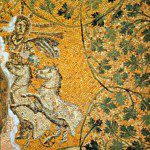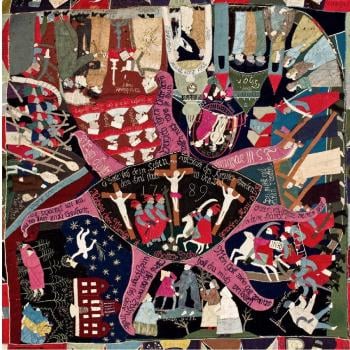![Statue of C.S. Lewis by Genvessel" [CC BY 2.0 (http://creativecommons.org/licenses/by/2.0)], via Wikimedia Commons](https://wp-media.patheos.com/blogs/sites/637/2017/07/Statue_of_C.S._Lewis_Belfast-200x300.jpg)
This conception in all its forms, Platonic, Aristotelian, Stoic, Christian, and Oriental alike, I shall henceforth refer to for brevity simply as ‘the Tao‘. Some of the accounts of it which I have quoted will seem, perhaps, to many of you merely quaint or even magical. But what is common to them all is something we cannot neglect. It is the doctrine of objective value, the belief that certain attitudes are really true, and others really false, to the kind of thing the universe is and the kind of things we are. Those who know the Tao can hold that to call children delightful or old men venerable is not simply to record a psychological fact about our own parental or filial emotions at the moment, but to recognize a quality which demands a certain response from us whether we make it or not.[1]
A central tenant of this Tao is the evil of avarice: what Paul wrote to Timothy could be said to be one of the basic elements of natural moral theology: “For the love of money is the root of all evils; it is through this craving that some have wandered away from the faith and pierced their hearts with many pangs” (1Tim 6:10 RSV). The love of money is united with a more general principle, craving, for the love of money develops out of the ability of money to satisfy craving, whether or not such craving should be satisfied. Avarice is able to turn someone away from God, because by accepting it, they will renounce God as the center of their lives, and instead, place wealth in his place. Whatever misfortune they suffer will make them curse God, while those who seem to be a success in the world, will simply ignore him. Thus, the Psalmist understood the fruits of avarice: “For the wicked boasts of the desires of his heart, and the man greedy for gain curses and renounces the LORD” (Ps. 10:3 RSV).
For the Christian, this natural theology, this Tao, should be examined and heeded, indeed, the non-believers who know it and follow it can be said to put greedy Christians to shame and so their wisdom should be heeded over reckless Christians:
Why do you, I ask you, wish to be worthy of damnation? Why is nothing dearer to you than injustice, nothing more pleasurable than avarice? Why is nothing more cherished than rapacity? Why do you judge nothing more precious than wickedness, nothing more profitable than plunder? Learn the true good from a pagan who says: ‘we should be fenced around with charity and good-will, not by arms.’ Therefore, your way of thinking leads you astray; the wickedness of a base and blind mind deceives you.[2]
Pagans, unbelievers, can be better followers of God than Christians when Christians think they no longer have to follow the Tao. When they think they do not have to follow any moral rule, they reject Christ himself, for he said he is himself the Tao, that is, he is himself the way, and he expects us to follow the whole of the way, the whole of the Tao, if we want to be saved. When non-Christians, be they Buddhists, Hindus, Muslims, or even atheists, naturally follow the Tao, while so-called Christians do not, then those non-Christians can be said to be following Christ, while his so-called followers are not. Alas, for those who claim to be Christian and yet proclaim a Gospel of grace without repentance, and a salvation without goodness, because by their words, they deny the preaching of Christ which was all about how to follow him by living out the Tao.[3]
Siddhartha the Buddha was able to proclaim the Tao, and as he did so, he affirmed greed was as unwholesome to those who possess it as with greed and any general delusion:
Vaccha, greed is unwholesome, non-greed is wholesome; hate is unwholesome, non-hate is wholesome; delusion is unwholesome, non-delusion is wholesome. In this way three things are unwholesome and the other three things are wholesome.[4]
So long as greed, the love of money, is promoted as an acceptable final good or objective for life, as we do in capitalistic societies, then the Tao, Christ, is being rejected and replaced with an idol of gold. Whatever good is found within someone who attached to money is destroyed by the greed itself. They will pretend to be moral, pretend to be religious, and they might believe it, but it is all external and miniscule; it has not reached into their hearts and so they remain unreformed. They will be deluded by their wealth, thinking they have justified themselves and God approves of them because of it, and so they will do little to nothing other than that which they think they need to do to continue receiving such blessings. Śaṅkarācārya, in his commentary on the Gita, therefore said of those trapped by avarice:
They ‘exalt themselves’ claiming to possess all excellences’ but no good men would praise them. ‘Stubborn’, not meek; being ‘rich’, they are ‘conceited and arrogant’. Their sacrifices are ‘nominal’ only and ‘hypocritical’, meant to show off their religiosity. [5]
Those who set up money as a proper goal in and of itself will interpret all actions in the light of whether or not they receive money. Whatever small virtue they can find in their own actions will be used to say that they remain on the path of virtue, and so will be not only unable, but unwilling, to stop themselves from doing all they can to satisfy their desires through their wealth:
And by seeing this and so on; when one of greedy temperament sees even a slightly pleasing visible object, he looks long as if surprised, he seizes on trivial virtues, discounts genuine faults, and when departing, he does so with regret as if unwilling to leave.[6]
To them, good or bad is found in whether or not they attain such money, leaving them, as the Jains understood, unable to distinguish right from wrong:
Souls, wandering in the forest of transmigratory existence, are bitten by the snake of greed, which robs them of their very life, that is, their ability to distinguish right from wrong. Thus they cannot tell what is good for them from what is bad for them.
Even the best virtues disappear if a person is possessed of greed, as drops of water are repelled from the surface of a heated piece of iron.
Just as an ordinary fire is never satisfied, no matter how much fuel it is fed; just as the subterranean fire at the bottom of the ocean is never satisfied, even by all the ocean’s waters, so is a person never satisfied, no matter how much money he may have.[7]
And so, wealth, being what is loved and desired, becomes the determination of morality for those under the sway of avarice. Their morality is off; they see what is moral as being what generates wealth, and what is immoral, as that which hinders their accumulation of money. And so, on the objectivity of the Tao, it can be said: “To satisfy their sensual desires, they endeavour for wealth through immoral means.”[8]













